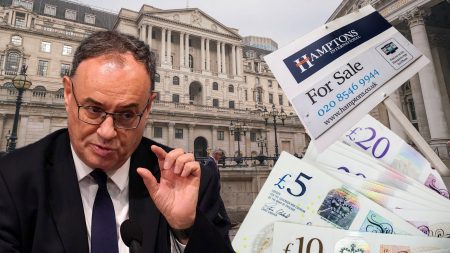The UK housing market is bracing for a potential surge in mortgage costs, impacting hundreds of thousands of homeowners in the coming years. Approximately 700,000 households are set to see their fixed-rate mortgage deals expire in 2025, exposing them to potentially higher interest rates. This vulnerability stems from a confluence of economic factors, including rising government borrowing costs, a weakening pound, and persistent inflationary pressures. These factors contribute to an environment of economic uncertainty, potentially dampening growth and impacting mortgage rates.
The rise in government borrowing costs, reflected in higher gilt yields, is a key driver of the anticipated mortgage rate increases. Gilts are government bonds issued to raise funds, and their yields represent the interest paid to investors. Increased investor concerns about persistent inflation and the UK’s economic outlook have driven up gilt yields. This, in turn, influences swap rates, which are benchmarks used by banks and lenders to determine fixed-rate mortgage offerings. The upward trajectory of swap rates suggests that fixed-rate mortgages could become more expensive, despite earlier predictions of potential declines.
The interplay between gilt yields, swap rates, and mortgage rates creates a complex web of interconnected financial mechanisms. Rising gilt yields, driven by investor anxieties about inflation and economic performance, translate into higher swap rates. These elevated swap rates then feed into the pricing of fixed-rate mortgages, potentially leading to increased borrowing costs for homeowners. This dynamic poses a significant challenge for those whose fixed-rate deals are expiring, leaving them vulnerable to a potentially substantial rise in monthly repayments.
The economic landscape is further complicated by the Bank of England’s base rate, which influences lending and savings rates across the financial system. While the base rate had been decreasing, reaching 4.75% after cuts from a 16-year high of 5.25%, the current economic uncertainties might influence the Bank of England’s future decisions on interest rates. The base rate impacts tracker mortgages directly and indirectly influences fixed-rate deals when they are renegotiated. While some lenders initially lowered rates in a “mini price war,” rising government borrowing costs and swap rates could pressure other lenders to increase their mortgage rates.
Homeowners facing the expiration of their fixed-rate deals are advised to seek expert advice from mortgage brokers. Brokers can provide comprehensive market insights and help borrowers navigate the complex landscape of mortgage products, potentially securing the most favorable rates. One strategy is to lock in a new rate several months in advance, offering peace of mind and the flexibility to switch to a lower rate if market conditions improve. This proactive approach can help mitigate the impact of rising rates and ensure borrowers obtain the best possible terms.
Understanding the various mortgage types is crucial for homeowners. Fixed-rate mortgages offer predictable repayments over a set period, while variable-rate mortgages fluctuate with market conditions. Tracker mortgages follow the Bank of England base rate, and standard variable rates (SVRs) are typically higher default rates. Navigating these options requires careful consideration of individual financial circumstances and risk tolerance. Homeowners should also be aware of exit fees associated with fixed-rate deals, which might play a role in deciding whether to switch to a new deal before the existing one expires. Analyzing the potential savings from switching against the exit fee is crucial to making an informed decision. Ultimately, seeking professional advice and utilizing comparison tools and calculators can empower homeowners to secure the most suitable and cost-effective mortgage deal.










